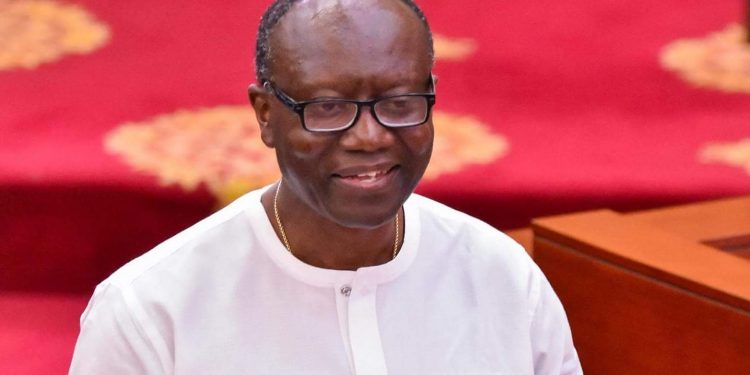Accumulation and sustainability of debt relative to gross domestic product (GDP) in the Ghanaian economy have been a major concern to some citizens, financial and economic analysts in recent years.
The debt-to-GDP ratios recorded by Ghana in recent years are as follows: 2012 = 35.58%; 2013 = 43.22%; 2014 = 51.16%; 2015 = 54.83%; 2016 = 57.12%; 2017 = 57.27%; 2018 = 59.29%; 2019 = 63.01%; and 2020 = 63.46%.
The actual figures revealed steady increase in debt-to-GDP ratios over the period. However, the rate of increase varied from one financial year and political-administrative period to the other; the rate of increase varied from 2013 through 2016, and from 2017 through 2020 respectively.
Available data from 2012 through 2020 indicate the respective highest percentage points increase in Ghana’s debt-to-GDP ratios were recorded in 2014 (7.94%) and 2013 (7.64%).
The average percentage points increase in Ghana’s total debt accumulation from 2017 through 2020 is 1.59% ((0.15% + 2.02% + 3.72% + 0.45%) ÷ 4 = 6.34% ÷ 4 = 1.585 = 1.59%). This is significantly lower than the average rate of accumulation (5.39%) from 2013 through 2016. The average rate of debt accumulation from 2017 through 2020 is about 3.39 times (5.39% ÷ 1.59% = 3.38994 = 3.39 times) lower than the average accumulation rate from 2013 through 2016.
Although total national expenditure for the current financial year is expected to increase to commensurate with the increasing cost of fighting the COVID-19 pandemic, the economy is projected to record the second-lowest percentage point increase (0.45%) in accumulated debt relative to GDP since 2013.
This affirms effective management of the Ghanaian economy in the last four years; and the institution of prudent and pragmatic measures to mitigate foreseen and unforeseen economic shocks. The relatively low percentage points increase in accumulated national debt from 2017 through 2020 could be attributed largely to the debt re-profiling strategy adapted and implemented by current managers of the Ghanaian economy. Debt re-profiling has resulted in extended payment periods, reduction in interest rates and interest charges; and an overall decrease in total national debt.
Ghana’s accumulated debt-to-GDP ratio for 2019 was estimated at 63.01%. Some economic pundits consider this ratio to be high.
However, it compared favourably with debt-to-GDP ratios recorded by the following advanced, emerging, and developing economies during the period: Japan 238%; Greece 177%; Lebanon 151%; Italy 135%; Singapore 126%; Cape Verde 124%; Portugal 118%; Angola 111%; Mozambique 109%; United States 107%; Djibouti 104%; France 98.1%; Cyprus and Spain 95.5%; Egypt 90.0%; Canada 89.7%; Gambia 81.8%; United Kingdom 80.7%; Mauritania 79%; Brazil 75.79 %; Sao Tome and Principe 73.1%; India 69.62%; and Tunisia 71.4%.
All else held constant, the debt-to-GDP ratios for most of the foregoing economies, including Ghana are likely to increase while growth may blip at the end of the current financial year. For instance, total debts of the United Kingdom in 2020 are projected to surge while economic growth during the period is expected to slump by about 10%. The initial growth target of 6.5% for the Ghanaian economy has been reviewed downward to 1.5% while the Chinese economy is projected to contract by 42%.
As noted elsewhere, the full effects of COVID-19 on the Ghanaian economy are yet to be felt. This notwithstanding, there is no gainsaying the salient and carefully-thought-through measures and policies put in place by the current managers of the Ghanaian economy are yielding positive dividends; these measures and policies are strong contributing factors to Ghana’s “controlled” expenditure in the midst of the deadly COVID-19 pandemic. But for stringent measures, Ghana’s total spending in the wake of COVID-19 would have spiraled to uncontrollable limits.
The effect of COVID-19 on global economies including Ghana in the current financial year is portentous. As a result, the nation’s economic trajectory cannot be focused essentially on lower fiscal deficit and debt financing as growing expenditures in the wake of COVID-19 are met with falling revenues.
Advanced, emerging, and developing economies such as the United States, China, United Kingdom, Brazil, and Tunisia, among others, are equally compelled by the pandemic to engage in deficit financing. In perilous socio-economic times such as this, it is incumbent on national leaders to implement measures that would assure lives and livelihoods of their respective citizens and other inhabitants therein; the emphasis in the immediate-term is not on lower deficits and debts.
Source: thebftonline





